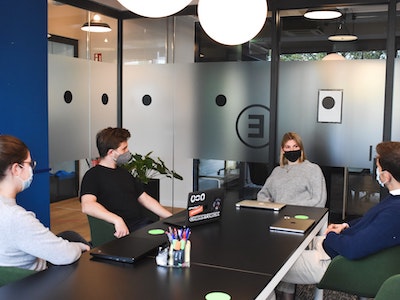
Article by Joanne Caine, Managing Director, Cathedral Appointments
While many employees have craved the return to the office, ridding themselves of social isolation and the same four walls, not everyone is excited about the return to work.
And even though, as reported in Marie Claire, over half a million Brits won’t be returning to the office full-time, the idea of going back to ‘normality’ at all is nerve-wracking for many.
With the risk of COVID-19 not yet completely dissipated, combined with a loss of flexibility for many, it’s no surprise that that, as found by The Independent, five million workers are worried about returning to the workplace. So, how can employers and employees work together to make the next transitional stage of the roadmap as seamless and stress-free as possible?
Understand the risks and prevention measures
Employers will have, hopefully, undertaken a multitude of risk assessments prior to everyone’s return. However, as an employee, you’re well within your rights to ask questions about what additional precautions have been put in place to make the office as COVID-secure as possible. This could be anything from handwashing facilities to increased cleaning of high-traffic areas and social distancing guidelines. If you feel that more could be done, don’t be afraid to have this conversation with your employer and request additional resources.
According to ISSA, the regulatory cleaning body, 92 per cent of employees say a clean office gives them peace of mind. Not forgetting to mention the impact unwell employees have on a business’ bottom-line – sick staff costs British firms £77 billion per year in lost productivity, according to Vitality Health.
Voice your concerns
It’s natural to feel anxious about the return to work. After such a prolonged period of time adjusting to working from home while also juggling the threats and consequences thrown at us as a result of the pandemic, to suddenly have to completely change routines once again is going to throw even the most confident person off track. While employers will be able to anticipate the nervousness employees will undoubtedly feel, it’s crucial that employees remain open and honest at all times, being transparent with the true extent of their concerns or worries in order to be supported in the best way possible.
Similarly with employers, ensure you approach the next step with an ‘open door’ policy, making time whenever possible to sit down with your team members and listen to their questions and worries as often as necessary.
Take things slowly
As an employer, it can be tempting to get everyone back in the office all at once and celebrate this new renowned freedom. But not everyone will feel comfortable approaching normality with such a ‘gung-ho’ attitude. Ensure you take the time to listen to each individual’s needs and, where possible, look to tailor the return to work to suit them. This could be in the shape of a phased return or implementing flexible hours so they can avoid the busy rush hour commute times.
According to new research by the CIPD, over half of employees still don’t have access to flexible working and it’s taking a toll on wellbeing and productivity. Peter Cheese, chief executive of the CIPD, said employers needed a new understanding of flexible working, and to embrace alternative arrangements beyond simply home working. “Being able to build in flexible working arrangements, such as changes to hours, term-time working or job shares, will empower people to have greater control and flexibility in their working life.”
Look after yourself
Anxiety and stress can play havoc on our minds and bodies, so it’s crucial that you take time to decompress during this next phase and really take care of your own mental and physical wellbeing. From undertaking mindfulness and meditation to exercising and getting outside into fresh air regularly, taking the time to focus on hobbies and spend time with loved ones, allowing yourself to unwind is vital, especially over the next few months.
Read these next…
 Returning to work: how organisations can ensure a smooth transition back to the office
Returning to work: how organisations can ensure a smooth transition back to the office
It is true when people say that the world will never be the same again after the COVID-19 pandemic. This situation has showed how vulnerable we are and made us reconsider our values, as well as review our habits and attitude towards many things, with the first being work. Almost the whole world has switched to the remote work, which has never been done before and has significantly changed people’s interpretation of their daily work routines
 Getting back on our feet: returning to the office
Getting back on our feet: returning to the office
According a survey from the Office for National Statistics published in March 2021, three in 10 UK adults feel that life will return to normal within six months, up from the 20% recorded in February and 10% during the autumn of last year. Without a doubt, the UK is progressing cautiously yet steadily along a path leading out of COVID-19 restrictions via its roadmap, underpinned by the remarkable efforts of the NHS in delivering a national vaccination programme that will be vital to restoring the confidence needed to reintegrate society.
Are you looking to return to work after a career break? Searching for advice and tips? WeAreTheCity has a whole dedicated section to returnships and returning to work. You can find open returnship opportunities, advice for experts about returning to work and tips on flexible working.




 The ground-breaking nationwide celebration of women in technology returns, featuring a week of dynamic online and in-person events. Focused on career growth, networking, and innovation, this event continues to champion equality and empower women in the tech industry.
The ground-breaking nationwide celebration of women in technology returns, featuring a week of dynamic online and in-person events. Focused on career growth, networking, and innovation, this event continues to champion equality and empower women in the tech industry.



